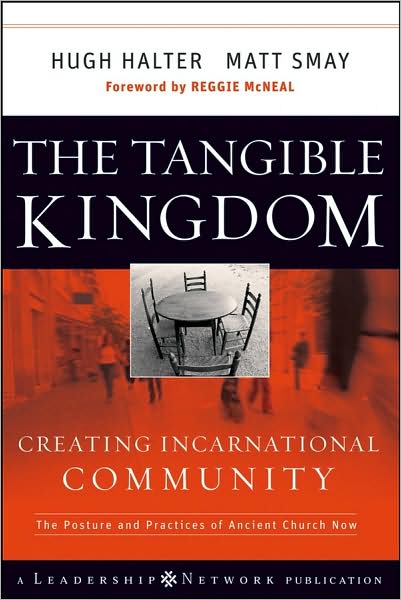The theme that rose to the forefront of the second day of Verge is just the old Reformation call to be a priesthood of all believers. The problem is, as Ed Stetzer put it, most Evangelical churches look like pre-Reformation Catholic churches. All the work is done by a leader with an almost gnostic secret knowledge, otherwise known as “seminary training.” The answer is to help every Christian understand they are a missionary, and, as Alan Hirsch put it “your baptism is your commission.”
A second theme that rose to the top is developing an awareness of the people and systems around you. I’ve long been challenged by the question “do you really know any non-Christians?” But Dave Watson expanded this by asking if we even try to develop strategies for people who don’t live like us. There are people who work graveyard shift and are up all night, but why aren’t there churches meeting at 4 in the morning?
My favorite presentation was by Hugh Halter of Denver, Colorado. Hugh is disturbingly honest in person in a way that his book cannot get across. His concept of a church with simple outwardly focused structure, that is still hard to get in to, sounds more authentic and natural than any Sunday morning show and awkward living room Bible Study I’ve ever taken part.
I’m excited for day three.


 I struggled to see the big deal is with Halter and Smay’s The Tangible Kingdom. But by the time I got to the end of their memoir/ecclesiological manifesto, I found myself anxious to get back to church as they describe it. Tangible describes an unpretensious church, where the unchurched and dechurched can belong before they believe. It shows the messiness of doing life with those who are far from God. It also paints the church as a simple, organic body that is more like a gathering of friends than a rock concert. Halter and Smay are more interested in telling stories than laying out structure, which may be the books only downfall. It shows you what your posture should be, but leaves the questions about how to organize.
I struggled to see the big deal is with Halter and Smay’s The Tangible Kingdom. But by the time I got to the end of their memoir/ecclesiological manifesto, I found myself anxious to get back to church as they describe it. Tangible describes an unpretensious church, where the unchurched and dechurched can belong before they believe. It shows the messiness of doing life with those who are far from God. It also paints the church as a simple, organic body that is more like a gathering of friends than a rock concert. Halter and Smay are more interested in telling stories than laying out structure, which may be the books only downfall. It shows you what your posture should be, but leaves the questions about how to organize.
 With the hype about The Shack it’s hard to narrow what to say about it. I will say this: it is an incredibly important book. Young’s allegory of a man overcoming tragedy and coming to know God gives us a deep understanding of our brokenness and the wholeness of the trinitarian relationship God invites us into. Those who focus on the short comings of Young’s picture of God don’t get what he’s trying to do. For one thing, the Trinity is the deepest mystery of the Christian faith, so it’s naive to think any one parable would capture it all. Despite it’s shortcomings, The Shack has given us an image of a divine relationship, and something to work towards in our walk with God and others.
With the hype about The Shack it’s hard to narrow what to say about it. I will say this: it is an incredibly important book. Young’s allegory of a man overcoming tragedy and coming to know God gives us a deep understanding of our brokenness and the wholeness of the trinitarian relationship God invites us into. Those who focus on the short comings of Young’s picture of God don’t get what he’s trying to do. For one thing, the Trinity is the deepest mystery of the Christian faith, so it’s naive to think any one parable would capture it all. Despite it’s shortcomings, The Shack has given us an image of a divine relationship, and something to work towards in our walk with God and others.





 Tweets
Tweets